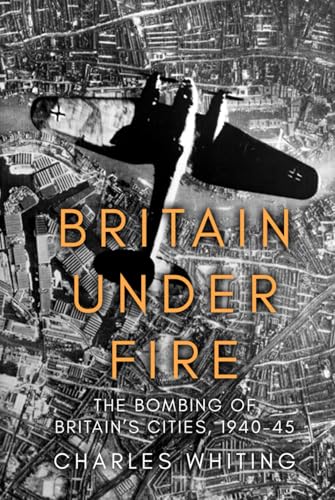
An incredibly detailed chronicle of the devastating German bombing raids over Britain during World War Two, from 1940 to 1945. Perfect for fans of Juliet Gardiner, Joshua Levine, John Conen, and Richard Overy. On 4th September 1939, following the announcement that Britain was at war with Germany, Hitler fatefully “We will raze their cities to the ground.” While the nation’s young men were sent away to fight, the Führer planned to bring death and destruction to the homes and families they had left behind. Charles Whiting draws on a wealth of original source material in this book—including personal interviews with those directly involved on both sides, letters, newspaper and parliamentary reports, and other written works—to present a vivid and personal account of five terrible years of war on the home front. Whiting explores the political situation in the country prior to the first bombs falling, the decisions that were made, and how the authorities planned and prepared—or failed to prepare—for what was to come. While the basic story of the Blitz may be relatively well known, this book is packed with incredible details about the country’s organisation and its ability to respond to the devastation. Whiting also presents harrowing accounts of human suffering and the often hidden, darker side of how people responded to tragedy. The story concludes with the terrifying arrival of Hitler’s secret weapons—the V-1 and V-2 rockets—the advance intelligence, Britain’s response, and their impact on a nation already pushed to the brink.
Author

Charles Whiting was a British writer and military historian and with some 350 books of fiction and non-fiction to his credit, under his own name and a variety of pseudonyms including Ian Harding, Duncan Harding, K.N. Kostov, John Kerrigan, Klaus Konrad, and Leo Kessler. Born in the Bootham area of York, England, he was a pupil at the prestigious Nunthorpe Grammar School, leaving at the age of 16 to join the British Army by lying about his age. Keen to be in on the wartime action, Whiting was attached to the 52nd Reconnaissance Regiment and by the age of 18 saw duty as a sergeant in France, Holland, Belgium and Germany in the latter stages of World War II. While still a soldier, he observed conflicts between the highest-ranking British and American generals which he would write about extensively in later years. After the war, he stayed on in Germany completing his A-levels via correspondence course and teaching English before being enrolled at Leeds University reading History and German Language. As an undergraduate he was afforded opportunities for study at several European universities and, after gaining his degree, would go on to become an assistant professor of history. Elsewhere, Whiting held a variety of jobs which included working as a translator for a German chemical factory and spells as a publicist, a correspondent for The Times and feature writer for such diverse magazines as International Review of Linguistics, Soldier and Playboy. His first novel was written while still an undergraduate, was published in 1954 and by 1958 had been followed by three wartime thrillers. Between 1960 and 2007 Charles went on to write over 350 titles, including 70 non-fiction titles covering varied topics from the Nazi intelligence service to British Regiments during World War II. One of his publishers, Easingwold-based Rupert Smith of GH Smith & Son said he was a quiet man and prolific writer. "He's one of a band of forgotten authors because he sold millions of copies and still, up to his death was doing publishing deals.He was the kind of man who was very self-effacing, one of Britain's forgotten authors, still working at 80 years of age, with his nose down and kicking out books." Charles Henry Whiting, author and military historian died on July 24 2007, leaving his wife and son.